|
|
|
Sort Order |
|
|
|
Items / Page
|
|
|
|
|
|
|
| Srl | Item |
| 1 |
ID:
170498
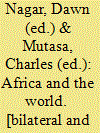

|
|
|
|
|
| Publication |
Switzerland, Palgrave Macmillan, 2018.
|
| Description |
xxxiv, 520p.: figures, tableshbk
|
| Standard Number |
9783319625898
|
|
|
|
|
|
|
|
|
|
|
|
Copies: C:1/I:0,R:0,Q:0
Circulation
| Accession# | Call# | Current Location | Status | Policy | Location |
| 059817 | 327.6/NAG 059817 | Main | On Shelf | General | |
|
|
|
|
| 2 |
ID:
099575
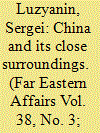

|
|
|
|
|
| Publication |
2010.
|
| Summary/Abstract |
The article analyzes priorities in China's foreign policy. It examines certain aspects of the regional and bilateral relations of the PRC with Japan, North Korea, South Korea, the Russian Federation, Mongolia, Central Asia, ASEAN, India and Pakistan.
|
|
|
|
|
|
|
|
|
|
|
|
|
|
|
|
| 3 |
ID:
134050
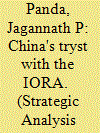

|
|
|
|
|
| Publication |
2014.
|
| Summary/Abstract |
Engaging with a multilateral body requires constructive foreign policy forethought, especially for a country that is not a fully fledged member of that body. China's overtures to the Indian Ocean Rim Association (IORA) exemplify this approach. The Indian Ocean and India are the two most immediate elements in China's policy approach to the IORA. With 20 member states, extra-territorial major powers as important dialogue partners, and the increasing importance of energy politics in the region, the IORA today is a significant multilateral body in China's calculus. Beijing's involvement with the IORA bespeaks the construct and strategy of a great power. For India, China's power construct in this matter poses three challenges: Beijing as a maritime power; Beijing as an economic power; and Beijing as a polygonal power.
|
|
|
|
|
|
|
|
|
|
|
|
|
|
|
|
| 4 |
ID:
125014
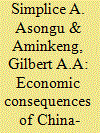

|
|
|
|
|
| Publication |
2013.
|
| Summary/Abstract |
This study dissects with great acuteness some of the big questions on China-Africa relations in order to debunk burgeoning myths surrounding the nexus. It reviews a wealth of recent literature and presents the debate in three schools of thought. No substantial empirical evidence is found to back up sinister prophesies of coming catastrophe from critics of the direction of China-Africa relations. In the mean, the relationship from an economic standpoint is promising and encouraging but more needs to be done regarding multilateral relations, improvement of institutions, and sustainability of resources management. A number of positive signs suggest that China is heading toward the direction which would provide openings for a multipolar dialog. While benefiting in the short run, African governments have the capacity to tailor this relationship and address some socio-economic matters arising that may negatively affect the nexus in the long term. Policy implications are discussed.
|
|
|
|
|
|
|
|
|
|
|
|
|
|
|
|
| 5 |
ID:
129634
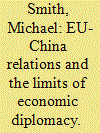

|
|
|
|
|
| Publication |
2014.
|
| Summary/Abstract |
This paper addresses a key problem in EU-China economic relations: the capacity of the EU to exert leverage through its economic diplomacy in the context of key economic trends, policy dilemmas, and processes of governance. The paper begins by identifying key elements of the EU's economic diplomacy and their relationship to key functions: deliberation, representation, communication, and negotiation. It continues by reviewing key trends and challenges in EU-China economic relations, in terms of trade, finance/investment, and broader issues of economic performance, with special reference to the problems emanating from the current economic turbulence both in the EU and in the broader global political economy. It then identifies a number of key policy dilemmas for the EU in areas such as trade defense/trade promotion, environment/development, security/commercial priorities, nvestment/sovereignty, and explores these in terms of three key concepts: orientation, coordination, and effectiveness. In pursuing this analysis, the paper relates these trends and dilemmas to attempts to govern EU-China economic relations: public/private, bilateral/multilateral, and regulatory/political. In the final section of the paper, these efforts are evaluated in the context of the EU's economic diplomacy, with relation to key actors, processes, and outcomes and to the key functions of deliberation, representation, communication, and negotiation.
|
|
|
|
|
|
|
|
|
|
|
|
|
|
|
|
| 6 |
ID:
132557


|
|
|
|
|
| Publication |
2014.
|
| Summary/Abstract |
Insofar as Europe's security and cohesion have for decades been premised upon a strong American political and strategic engagement, Washington's intention to "rebalance" to Asia casts a shadow over the sustainability of a stable and coherent geopolitical order on the continent. This article argues that as the United States seeks to rebalance strategically towards the Asia-Pacific region a number of "indigenous" geopolitical trends are becoming increasingly important in Europe: an Anglo-French entente for a "maritime" Europe, a German-French "continental" project of economic and political integration, and Russia's resurgence across Europe's East. The growing prominence of competing geopolitical visions for Europe might even call into question the cohesion and direction of the institutional expressions of the U.S.- engineered Western order in Europe, namely the Atlantic Alliance and the European Union. Increasing geopolitical and institutional contestation, we contend, pose a number of challenges for both U.S. interests and European security.
|
|
|
|
|
|
|
|
|
|
|
|
|
|
|
|
| 7 |
ID:
129410
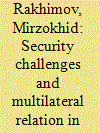

|
|
|
|
|
| Publication |
2014.
|
| Summary/Abstract |
New geopolitics and security Central Asia faced considerable political, social, and cultural changes throughout the whole of the 20th century; since the beginning of the 21st century, the region is confronted to new steps of the geopolitical transformation. Some experts say that Central Asia is returning to the Great Game of the 19th century but with new players. It is well-known that Central Asia historically was in the center or important aspects of interest of different empires and one could say that the region was more or less in Great Game situation during all periods of its history. After the collapse of the Soviet Union, the newly Independent Central Asian republics tried to form new bilateral and multilateral relations and within a short time the Central Asian nations were formally recognized by many countries, which established with most of them diplomatic ties and exchanged diplomatic missions. The region's countries have joined the main international and regional organizations.
|
|
|
|
|
|
|
|
|
|
|
|
|
|
|
|
| 8 |
ID:
127450
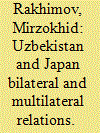

|
|
|
|
|
|
|
|